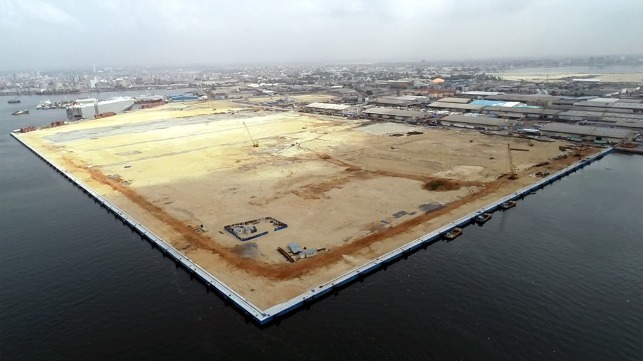Construction Beginning to Create a Regional Hub Port in West Africa

Efforts are underway to expand the port and terminal capabilities at Abidjan in Cote d’Ivoire (Ivory Coast) with a goal of creating a regional port for West Africa. A joint venture between Bolloré and APM Terminals will invest approximately $475 million to construct and equip the new Côte d’Ivoire Terminal (CIT).
The joint venture, which has a 20-year concession to operate the new terminal, recently signed contracts with the China Harbour Engineering Company (CHEC) for the construction of Abidjan’s second container terminal. The new terminal is scheduled to be operational at the end of 2021. This is one of several large infrastructure construction projects that Chinese companies have developed across the African continent in recent years.
Strategically located on the West African coast, the joint venture expects to be able to leverage the regional economy and the growth in exports and imports to create a regional hub. By expanding the capacity of the port, they expect that Abidjan can become a preferred gateway for surrounding landlocked countries such as Burkina Faso, Mali and Niger and a transhipment center.
“Shipping lines have started to deploy very large container vessels on the trades to/from West Africa that need deep water facilities and modern terminals able to handle them with much higher productivity,” said Koen De Backker, Managing Director of CIT, attributing the growth to increasing trade in West Africa and lower slot cost for the services.
Phase one of the project to create the new terminal adjacent to the existing Abidjan Terminal was handled by the Port Autonome d’Abidjan (PAA) and consisted of the deepening and widening of the access channel. They also undertook a land reclamation project to create the site of the new terminal and an adjacent roll-on roll-off facility. In addition, an $80 million expansion of the existing Abidjan Terminal was completed in 2015, nearly doubling its annual container capacity from 800,000 to 1.5 million TEU.
The construction contracts signed for the second phase of the project will see the completion of the new terminal able to handle a larger new-generation ships of up to 14,000 TEU and 350 meters in length. Once completed, CIT will have 1,100 meters of quay and a maximum draft of 18 meters. The existing Abidjan Terminal can currently accommodate vessels up to an 11.5-meter draft.
The terminal will also have a rail yard with two 300 meter tracks, and offer reefer plugs for up to 1,100 containers. The terminal also signed a contract for six post-panamax gantry cranes, 13 e-RTG’s and 36 Tugmasters. Once the terminal approaches an agreed volume threshold, they plan to add additional equipment to support the its continued expansion.
“A more efficient and competitive port, with latest generation container handling equipment and deep draft, will help reduce the cost of handling cargo, and fuel trade growth and transhipment volumes,” commented De Backker. Significant transhipment volumes destined for Guinea (Conakry), Sierra Leone (Freetown) and Liberia (Monrovia) are expected.
Once completed, the terminal will employ more than 400 people and is expected to add an additional 1.2 million TEU in annual throughput capacity, in its first phase of development.
